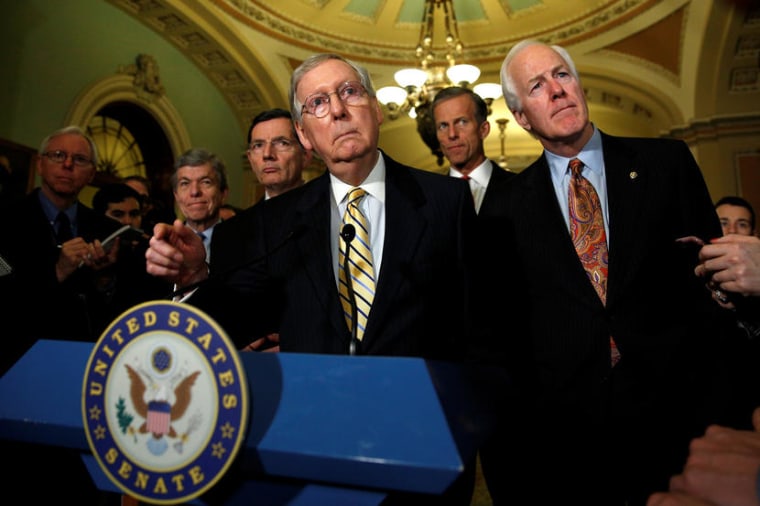Shortly after midnight, Donald Trump published his latest missive on a possible economic aid package, insisting that Republicans are "ready to go," but House Speaker Nancy Pelosi (D-Calif.) "couldn't care less" about helping the economy. As presidential lies go, it was a doozy.
In reality, Pelosi and House Democrats have already passed two ambitious aid packages, indifferent to the fact that the proposals would give the economy a significant pre-election boost while Trump seeks re-election. Senate Republicans, meanwhile, have made it abundantly clear to the White House that they're staunchly opposed to any robust effort to help the economy.
And that, in turn, has led to a question that's lacked an obvious answer: Why, exactly, are GOP lawmakers so opposed to giving the economy a boost ahead of Election Day?
The official answer from Senate Republicans is that they're now concerned about the deficit. This is literally unbelievable, not only because they voted for other economic aid packages this year without regard for budget shortfalls, but also because GOP lawmakers have ignored deficit considerations throughout Trump's term.
But if the official answer is bogus, what's the truth? Bloomberg News had an interesting report on this yesterday:
A GOP strategist who has been consulting with Senate campaigns said Republicans have been carefully laying the groundwork to restrain a Biden administration on federal spending and the budget deficit by talking up concerns about the price tag for another round of virus relief. The thinking, the strategist said, is that it would be very hard politically to agree on spending trillions more now and then in January suddenly embrace fiscal restraint.
The Washington Post's Greg Sargent added, "It's also likely that a big package now would put the economy in a somewhat better position early next year, when Biden (should he win) would take over. This, too, is probably what Republicans want to avoid."
From a policy perspective, this is indefensible, but from a political perspective, at least it's coherent.
Senate Majority Leader Mitch McConnell (R-Ky.) and the rest of the GOP leadership know that blocking an economic aid package will lead to a lot of unnecessary suffering. But they're thinking less about 2020 and more about 2021: if the Biden/Harris ticket prevails, as now appears likely, Republicans will magically return to their pre-2017 posture, forget everything they said during Trump's (and George W. Bush's) presidency, and demand sweeping austerity measures.
When Democrats howl, McConnell & Co. will point to the current fight and say, "We're being consistent."
In other words, Republicans are blocking Trump's economic goals today in order to stand in the way of Biden's economic goals tomorrow. If/when a Democratic White House looks to Capitol Hill to create a strong and lasting economic recovery, McConnell is laying the groundwork now to say no.
As strategies go, it's probably too clever by half. For one thing, by standing in the way of economic lifelines, Senate Republicans are likely putting their own majority at greater risk. For another, no serious observer -- at least no one with any memory of the last few decades -- will be able to take seriously the idea that the GOP is genuinely concerned about the deficit.
But let's also not forget that a reckoning on the filibuster may also be drawing near. It's quite possible that we'll see Democrats in control early next year, taking the reins against a backdrop of a struggling economy and a public desperate for action. Republicans are apparently already preparing to block any meaningful proposals -- from the minority -- effectively trying to cut off a Biden presidency at the knees in its early months. (It would be a replay of early 2009: see chapter 2 of my book.)
Would Democrats tolerate such tactics or would they scrap the filibuster, pass an economic package, and rescue the economy?
